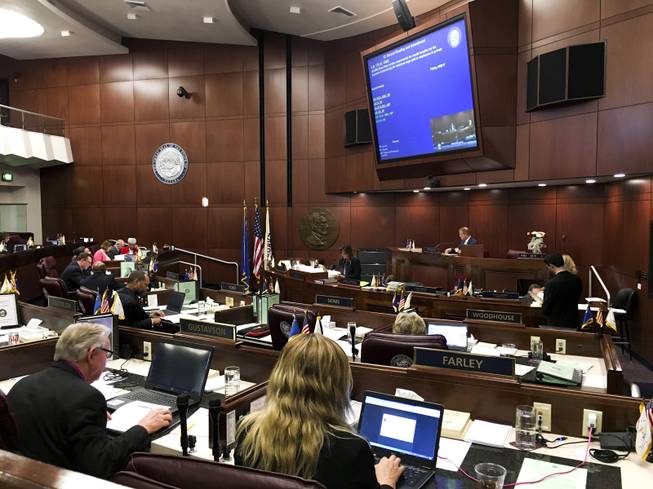
Members of the Nevada Senate convene a session in the Senate Chambers in Carson City on Friday June 2, 2017.
Wednesday, June 21, 2017 | 2 a.m.
The state is moving forward with what one lawmaker called a more holistic approach to criminal justice, but has held off on shortening certain sentences.
Lawmakers passed several bills this year that were aimed at reforming the criminal justice system, from disenfranchisement to private prisons. Gov. Brian Sandoval had a mixed response to these measures, agreeing that some ex-felons should regain the right to vote but vetoing a measure that sought shorter sentences for certain crimes.
“I signed a lot of Democratic priorities with regard to record-sealing and establishing civil rights in the criminal justice system,” Sandoval said last week. “ … There were just some bills that I felt went a little bit too far, and so that was the reason for the vetoes.”
Assembly Bill 259 would set out how courts would decide petitions to have certain marijuana convictions vacated. The governor vetoed this bill on June 12, saying he signed measures giving people with marijuana convictions avenues to have those records sealed.
“Individuals with prior convictions for possession of marijuana in amounts now legal in Nevada should be able to get their criminal records cleared expeditiously,” Sandoval said in his veto message.
“However, AB259 does more than create a new process for certain, limited marijuana offenses," he said. “It also adds other marijuana crimes to its reach, makes even more changes to Nevada's record-sealing law (the law already changed substantially with at least two other bills this legislative session), and gives judges discretion to depart from statutory minimum prison sentences in almost all other drug-possession cases.”
Also vetoed was a proposed ban on private prisons, sponsored by Assemblywoman Michele Monroe-Moreno, D-North Las Vegas. Sandoval cited possible future incarceration needs in his veto letter.
Monroe-Moreno said the governor has signed many bills reforming the system, even though hers was not one of them.
“Everyone on all aspects of it really want to see a more holistic approach to law enforcement and reform it so that it’s fair, not just for the officers that are working in the field and in the jails, but for the inmates and suspects that we deal with,” Monroe-Moreno said. “I think everyone wants a fair system … it’s going to be baby steps to get us there.”
The governor said he did sign Senate Bill 451 to create the Nevada Sentencing Commission, where membership duties will include making recommendations on adopting sentencing guidelines. That bill received near unanimous support in the Legislature, with three Assembly Republicans voting against it.
Sandoval parted with Republicans on Assembly Bill 384, the so-called Ban the Box measure, which limits the consideration of criminal histories for certain public job applicants. The bill passed the Legislature on party-line votes before it was approved by the governor, becoming effective Jan. 1.
Voting for ex-felons, Assembly Bill 181, also received the governor’s support after opposition in the Legislature. The Senate voted 12-8 and the Assembly voted 29-13.
Senate Bill 125 cuts down the waiting period for a person to petition a court to seal conviction records. This bill also received Sandoval’s signature after some Republican lawmakers opposed it, and will go into effect Oct. 1.
Assembly Bill 268 allows felons to petition to pay for DNA analysis. The bill was signed by the governor on June 8 and will go into effect July 1.
Senate Bill 268 deals with pre-release services for inmates, such as helping them with paperwork needed to get a driver’s license or some other identification they are eligible for. The bill received some Republican opposition before the governor gave it his approval on June 12. The law will become fully effective on Oct. 1.
Assembly Bill 420 would allow inmates to use phones, cellphones or computers to correspond with family, search for jobs and educate themselves. The law will be in full effect on Jan. 1.
Majority Leader Sen. Aaron Ford of Las Vegas says criminal justice reform was a Democratic priority this year.
“We indicated at the beginning of the session that we would focus on trying to reintegrate ex-offenders back into society, that we would try to make our criminal justice system fairer and that we would look to restore certain rights to ex-felons so again they could reintegrate into society and be active social agents,” Ford said last week. “Some of those met with the favor of the governor and he signed them, others of those he felt ran afoul of his own particular beliefs. That’s his prerogative.”
Monroe-Moreno, a retired corrections officer, said changes in dealing with suspects and inmates will continue in the future. She said people have marched and protested across the country advocating for fairness in the system, and though the governor did not sign all of the reforms to come across his desk, he’s helped advance the movement.
“On both sides, there are issues we need to work on,” Monroe-Moreno says. “It’s not perfect.”

Join the Discussion:
Check this out for a full explanation of our conversion to the LiveFyre commenting system and instructions on how to sign up for an account.
Full comments policy